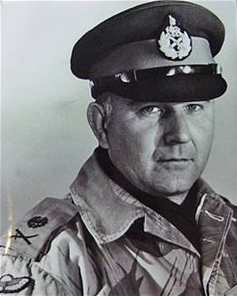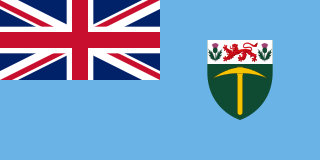
Rhodesia, officially from 1970 the Republic of Rhodesia, was an unrecognised state in Southern Africa from 1965 to 1979. During this fourteen-year period, Rhodesia served as the de facto successor state to the British colony of Southern Rhodesia, and in 1980 it became modern day Zimbabwe.

The Zambian Defence Force is the military of Zambia. It consists of the Zambian Army, the Zambian Air Force, and the Zambia National Service. The defence forces were formed at Zambian independence on 24 October 1964, from constituent units of the dissolved Federation of Rhodesia and Nyasaland Armed Forces. During the 1970s and 1980s, it played a key role in a number of regional conflicts, namely the South African Border War and Rhodesian Bush War. Being a landlocked country Zambia has no navy, although the Zambian Army maintains a maritime patrol unit for maintaining security on inland bodies of water.

United Nations Security Council Resolution 425, adopted on 19 March 1978, five days after the Israeli invasion of Lebanon in the context of Palestinian insurgency in South Lebanon and the Lebanese Civil War, called on Israel to withdraw immediately its forces from Lebanon and established the United Nations Interim Force In Lebanon (UNIFIL). It was adopted by 12 votes to none; Czechoslovakia and the Soviet Union abstained, and China did not participate.

The Rhodesian Bush War, also known as the Rhodesian Civil War, Second Chimurenga as well as the Zimbabwe War of Independence, was a civil conflict from July 1964 to December 1979 in the unrecognised country of Rhodesia.

The Mozambican Civil War was a civil war fought in Mozambique from 1977 to 1992. Like many regional African conflicts during the late twentieth century, the impetus for the Mozambican Civil War included local dynamics exacerbated greatly by the polarizing effects of Cold War politics. The war was fought between Mozambique's ruling Marxist Mozambique Liberation Front (FRELIMO), the anti-communist insurgent forces of the Mozambican National Resistance (RENAMO), and a number of smaller factions such as the PRM, UNAMO, COREMO, UNIPOMO, and FUMO.

The Internal Settlement was an agreement which was signed on 3 March 1978 between Prime Minister of Rhodesia Ian Smith and the moderate African nationalist leaders comprising Bishop Abel Muzorewa, Ndabaningi Sithole and Senator Chief Jeremiah Chirau. After almost 15 years of the Rhodesian Bush War, and under pressure from the sanctions placed on Rhodesia by the international community, and political pressure from South Africa, the United Kingdom, and the United States, the Rhodesian government met with some of the internally based moderate African nationalist leaders in order to reach an agreement on the political future for the country.
The following lists events that happened during 1973 in Rhodesia.

Lieutenant General George Peter Walls was a Rhodesian soldier. He served as the Head of the Armed Forces of Rhodesia during the Rhodesian Bush War from 1977 until his exile from the country in 1980.

The history of Rhodesia from 1965 to 1979 covers Rhodesia's time as a state unrecognised by the international community following the predominantly white minority government's Unilateral Declaration of Independence on 11 November 1965. Headed by Prime Minister Ian Smith, the Rhodesian Front remained in government until 1 June 1979, when the country was reconstituted as Zimbabwe Rhodesia.

Air Rhodesia Flight 825 was a scheduled passenger flight that was shot down by the Zimbabwe People's Revolutionary Army (ZIPRA) on 3 September 1978, during the Rhodesian Bush War. The aircraft involved, a Vickers Viscount named the Hunyani, was flying the last leg of Air Rhodesia's regular scheduled service from Victoria Falls to the capital Salisbury, via the resort town of Kariba.
United Nations Security Council Resolution 326, adopted on February 2, 1973, concerned with provocative and aggressive acts committed by Rhodesia against Zambia and disturbed by the continued military intervention of South Africa in Rhodesia, the Council condemned all acts of provocation and harassment against Zambia.

United Nations Security Council Resolution 426, adopted on 19 March 1978 at the 2075th meeting of the Security Council, is concerned with both the creation of the United Nations Interim Force in Lebanon (UNIFIL) and the duration of its mandate. It comes immediately after and complements Resolution 425, adopted during an earlier meeting on the same day.

United Nations Security Council Resolution 393, adopted on July 30, 1976, after a letter from a representative from Zambia, the Council condemned a recent attack by South Africa in Zambian territory, resulting in the destruction of property and loss of life. The resolution went on to express concern at South Africa's occupation and use of South West Africa as a base for attacking neighbouring African countries, and that the continuation of this would constitute a threat to international peace and security.

In United Nations Security Council Resolution 423, adopted on March 14, 1978, after recalling its resolutions on Southern Rhodesia, particularly 415 (1977), the Council condemned attempts by the "illegal racist regime" in Southern Rhodesia to retain power and prevent the independence of Zimbabwe. It also criticised the country's executions of political prisoners and actions against neighbouring countries.

United Nations Security Council Resolution 428, adopted unanimously on May 6, 1978, after hearing representations from the People's Republic of Angola, Zambia and the South West Africa People's Organisation (SWAPO), the Council reminded Member States to refrain from using threats and use of force in their international relations. Reiterating Resolution 387 (1976), the present resolution condemned South Africa for its armed invasion of Angola via South West Africa (Namibia).

United Nations Security Council resolution 445, adopted on 8 March 1979, after recalling resolutions 253 (1968), 403 (1977), 411 (1977), 423 (1978), 424 (1978) and 437 (1978), and hearing representations from various countries, the council expressed its concern about the military operations undertaken by the "illegal regime" against countries both bordering and non-contiguous with Southern Rhodesia. The council was also indignant at the execution and sentences against persons under repressive laws.

United Nations Security Council resolution 448, adopted on 30 April 1979, after recalling resolutions 253 (1968), 403 (1977), 411 (1977), 423 (1978), 424 (1978), 437 (1978) and 445 (1979), the Council declared that the recent "sham" elections held in Southern Rhodesia by the "illegal racist regime" were illegal and the results thereof would be null and void.

United Nations Security Council resolution 455, adopted on 23 November 1979, after taking note of representations from Zambia and recalling Resolution 424 (1978), the Council expressed concern and condemned the "illegal racist regime" in Southern Rhodesia for its "sustained pattern of violations aimed at destroying the economic infrastructure" of Zambia and causing a number of deaths.

The Victoria Falls Conference took place on 26 August 1975 aboard a South African Railways train halfway across the Victoria Falls Bridge on the border between the unrecognised state of Rhodesia and Zambia. It was the culmination of the "détente" policy introduced and championed by B. J. Vorster, the Prime Minister of South Africa, which was then under apartheid and was attempting to improve its relations with the Frontline States to Rhodesia's north, west and east by helping to produce a settlement in Rhodesia. The participants in the conference were a delegation led by the Rhodesian Prime Minister Ian Smith on behalf of his government, and a nationalist delegation attending under the banner of Abel Muzorewa's African National Council (UANC), which for this conference also incorporated delegates from the Zimbabwe African National Union (ZANU), the Zimbabwe African People's Union (ZAPU) and the Front for the Liberation of Zimbabwe (FROLIZI). Vorster and the Zambian President Kenneth Kaunda acted as mediators in the conference, which was held on the border in an attempt to provide a venue both sides would accept as neutral.

The modern political history of Zimbabwe starts with the arrival of white people to what was dubbed Southern Rhodesia in the 1890s. The country was initially run by an administrator appointed by the British South Africa Company. The prime ministerial role was first created in October 1923, when the country achieved responsible government, with Sir Charles Coghlan as its first Premier. The third premier, George Mitchell, renamed the post prime minister in 1933.















